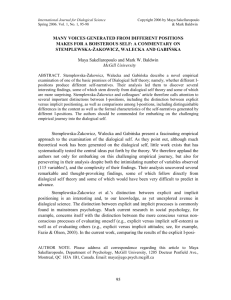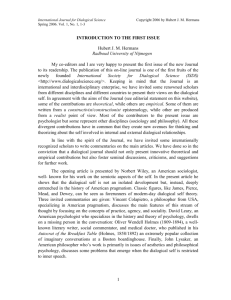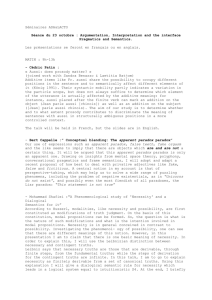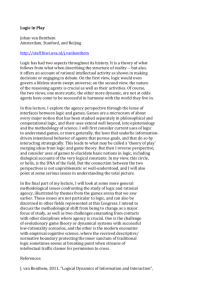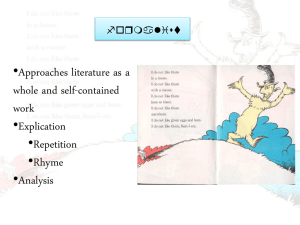דיאלוגיזם: חופש ותבונה
advertisement
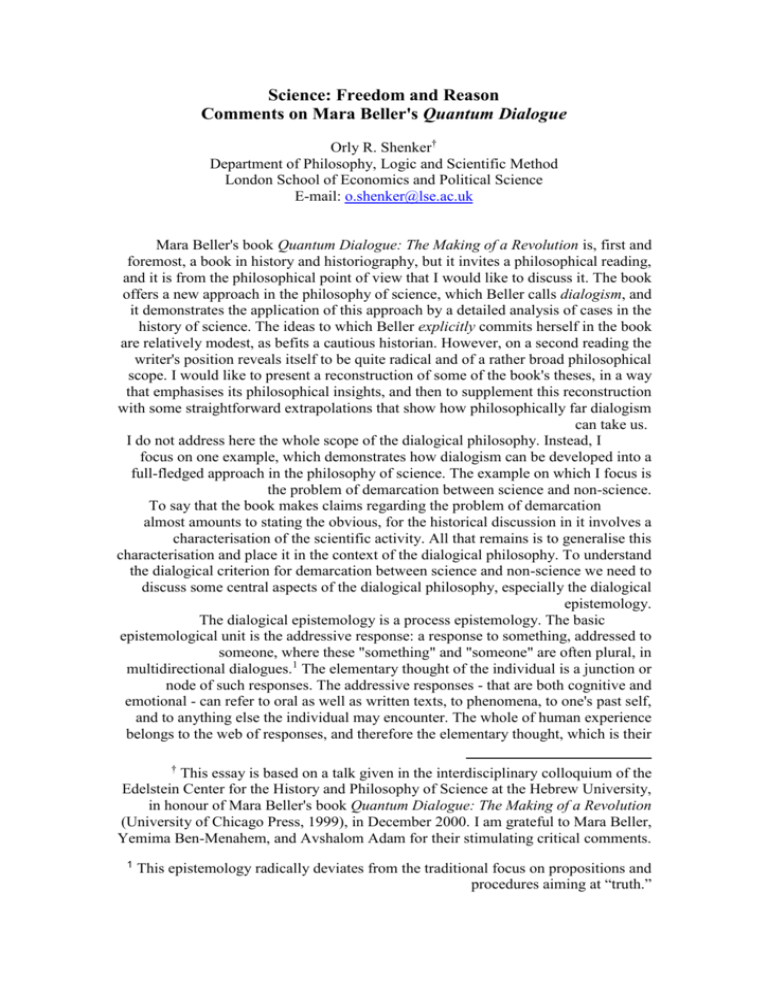
Science: Freedom and Reason Comments on Mara Beller's Quantum Dialogue Orly R. Shenker† Department of Philosophy, Logic and Scientific Method London School of Economics and Political Science E-mail: o.shenker@lse.ac.uk Mara Beller's book Quantum Dialogue: The Making of a Revolution is, first and foremost, a book in history and historiography, but it invites a philosophical reading, and it is from the philosophical point of view that I would like to discuss it. The book offers a new approach in the philosophy of science, which Beller calls dialogism, and it demonstrates the application of this approach by a detailed analysis of cases in the history of science. The ideas to which Beller explicitly commits herself in the book are relatively modest, as befits a cautious historian. However, on a second reading the writer's position reveals itself to be quite radical and of a rather broad philosophical scope. I would like to present a reconstruction of some of the book's theses, in a way that emphasises its philosophical insights, and then to supplement this reconstruction with some straightforward extrapolations that show how philosophically far dialogism can take us. I do not address here the whole scope of the dialogical philosophy. Instead, I focus on one example, which demonstrates how dialogism can be developed into a full-fledged approach in the philosophy of science. The example on which I focus is the problem of demarcation between science and non-science. To say that the book makes claims regarding the problem of demarcation almost amounts to stating the obvious, for the historical discussion in it involves a characterisation of the scientific activity. All that remains is to generalise this characterisation and place it in the context of the dialogical philosophy. To understand the dialogical criterion for demarcation between science and non-science we need to discuss some central aspects of the dialogical philosophy, especially the dialogical epistemology. The dialogical epistemology is a process epistemology. The basic epistemological unit is the addressive response: a response to something, addressed to someone, where these "something" and "someone" are often plural, in multidirectional dialogues.1 The elementary thought of the individual is a junction or node of such responses. The addressive responses - that are both cognitive and emotional - can refer to oral as well as written texts, to phenomena, to one's past self, and to anything else the individual may encounter. The whole of human experience belongs to the web of responses, and therefore the elementary thought, which is their † This essay is based on a talk given in the interdisciplinary colloquium of the Edelstein Center for the History and Philosophy of Science at the Hebrew University, in honour of Mara Beller's book Quantum Dialogue: The Making of a Revolution (University of Chicago Press, 1999), in December 2000. I am grateful to Mara Beller, Yemima Ben-Menahem, and Avshalom Adam for their stimulating critical comments. 1 This epistemology radically deviates from the traditional focus on propositions and procedures aiming at “truth.” 2 junction or node, is enormously complex. Nevertheless, it is elementary, in the same sense that a node in a net, as such, is an elementary unit despite being the connection between separate strings. Science, or the theories and praxis of science, is the product of all the addressive responses of the members of the scientific community, combined. (In dialogism, membership in an intellectual community is determined by the structure of the web of addressive responses.) According to the metaphor that the book adopts, science resembles a tapestry that is constantly being woven by co-operating weavers. Each scientist is free to add her part to the tapestry, and usually attempts to do so in response to the part already woven, so that the product will be as strong and as beautiful as possible. The weaving is free and creative: there is no blueprint to determine the end product, and the tapestry at a given point of time does not determine the way the weaving is to proceed. Moreover, the weavers may not agree on the merits of the individual contributions nor on those of the emerging pattern. On the other hand, the weavers act in response to the pattern created so far, and their contributions are subject to their peers' responses. Therefore the process of weaving, or of creating science, is neither arbitrary nor capricious. (The term "creating" indicates that, in my opinion, a constructivist approach fits the spirit of dialogism better than a realist approach of "discovery.”) This portrait of science, combined with the idea that the epistemological atom is the response, agrees with extreme individualism. I shall not elaborate here the details of the radical individualism of dialogism, but will show later that it is entailed by other aspects of the theory as well. The book proceeds beyond the general epistemological position of atomic responses, to describe the nature of the addressive responses found among members of the scientific community. Through a study of actual cases in the history of science, the book puts forward an important characterisation of addressive responses between scientists (acting as such), a characterisation that is important for developing the dialogical criterion of demarcation between science and non-science. The characterisation is the following. Often, scientists express disagreement, criticism, and doubt regarding the position to which they respond, while attempting to convince the addressee of an alternative position. The emphasis on the centrality of disagreement seems to me to be important for an approach that sees in the response the basic epistemological unit. Disagreement has to be with someone and therefore inherently assumes the "other." It is impossible to describe the state of mind of the addresser without referring to the addressee. By contrast, it is easy to describe concurring parties separately, for one can specify the opinion of each without mentioning the other, and not miss anything. (Of course, to say that we don't miss anything is to reject approaches in the philosophy of science that center around consensus; Quantum Dialogue clearly rejects them.) Since disagreement is an inseparable connection between the participants in a dialogue while agreement allows for their disentanglement, a state of disagreement is adequately and naturally described using an epistemology of connections or processes. For this reason, the dialogical epistemology, in which the basic unit is the addressive response, is a natural foundation for the way the book describes the history of science, namely, the emphasis on disagreement, criticism, and doubt as the forces behind scientific progress. I would now like to propose a description of these characteristics of the dialogical understanding of the history of science, one that is especially important for the dialogical criterion of demarcation between science and non-science. This 3 description is in terms of the ideals of freedom and reason. The state of art in the philosophy of science obliges me to pause for a brief apology. The ideas of freedom and reason have been with us for several centuries, and have met with strong criticism. The failure of logical positivism and the dominance of the approaches of Kuhn, Feyerabend, and the strong program in the sociology of science, make those who utter the words "freedom and reason" sound naive and childish. Dialogism does not ignore those criticisms; on the contrary, it assimilates them. It acknowledges the importance of the problem of underdetermination of theory by evidence and of the role of psychological and sociological elements in science. The assimilation of these criticisms is apparent, first, from the fact that dialogism emerged from, and finds support in, investigating historical cases; and secondly, from the dialogical emphasis on seeing science as a human creation, the product of human endeavour, with all the complexities associated with the human condition. The epistemological atom of response is both - and inseparably - cognitive and social. Hence, the way dialogism speaks about freedom and reason is far from naive. This is the place to use slogans: in my opinion, dialogism is a non-naive return to the freedom and reason of the individual. I use the term "a return" since I have chosen the words "freedom and reason" in order to emphasise that dialogism is a link in a chain with historical and philosophical predecessors. However, it is not a regression, for dialogism certainly doesn't bring us back to the same point exactly; the meaning of the terms "freedom and reason" here is distinctly dialogical, as I show below. One way to appreciate the uniqueness and significance of dialogism is to see that it relies on the criticisms brought forward by the irrationalist and sociological approaches, as a foundation for a philosophy that emphasises the ideals of reason and freedom. The ideas of freedom and reason play a central role in the dialogical criterion for demarcation between science and non-science. What exactly is the dialogical meaning of these ideas? Dialogism emphasises that scientific progress is the result of disagreement, doubt, and persuasion, and not of coercion or wilful submission or whim. (The difference between these two types of interaction is illustrated by the difference between the stories in the first and second parts of the book.) The emphasis on persuasion is a central characteristic of a reasoned discourse. The persuasion is of individuals and by individuals, and therefore the reason is that of the individual. (I use the term "reasoned discourse" to avoid the term "rational," which may be narrower by some accounts.) The criteria for being a "reasoned" discourse are in constant flux and are determined by the dialogical web, like everything else. These criteria are created by and while being applied. Therefore it is not clear to what extent we can distinguish, even in retrospect, between the part of the dialogue that determines the criteria for reason and the part in which these criteria are applied. This indistinguishability - the creation of the criteria by and while they are applied - saves us from infinite regress and circularity that would appear if we required that the criteria be determined in a reasoned discourse separately and beforehand. Freedom has two meanings here. One is associated with creation, for, as I have shown above, science may be likened to a tapestry, the weaving of which involves the non-arbitrary creative freedom of co-operating individuals. Another meaning of freedom here is the opposite of submission, whether wilful or forced. A reasoned dialogue is based on reciprocity and persuasion. These are opposed to obedience, to sanctification, and to accepting things simply because they are handed down by some authority. Indeed, a disrespect for authority seems to me to be a deeply entrenched value on which scientists are educated; it is a necessary condition for progress that 4 includes a criticism and - subsequently - an abandonment of once-cherished beliefs and theories. (The ideal of disrespect is not to be confused with a tactical acceptance of authority for pragmatic and immediate interests.) While submission, being consent without persuasion, means acceptance without response, disagreement - which is so central for dialogism - involves a refusal to succumb or obey; in other words, it involves freedom. Here, too, it is the individual who is free, being a member of the community out of free choice based on persuasion. On the basis of these ideals of reason and freedom it is now possible to present the dialogical criterion for distinguishing science from non-science in the dialogical approach as I understand it. The dialogical dichotomy between science and nonscience is the dichotomy between freedom, reason, and persuasion on the one hand, and coercion, submission, and whim on the other. That is all. This is a procedural criterion, which is non logical, and which ignores the contents of science completely a point to which I return below. The criterion of reason and freedom is a conclusion from a study of the history of science, and is therefore descriptive. Nevertheless, it clearly has normative consequences. The dialogical criterion is the diametrical opposite to Kuhn's approach, both descriptively and normatively (to repeat, from a different angle, the claims of the chapter in Quantum Dialogue that discusses Kuhn's thesis). Whereas Kuhn recommends submission without persuasion in normal science and rebellion without persuasion during revolutions, dialogism recommends a constant conjunction of free persuasion. It not only recommends it, but claims - and shows - that science actually works that way. Clearly, the terms on which the criterion of demarcation is based, those of freedom, reason, and persuasion, are vague, and a hard work of clarification and explication needs to be completed before dialogism becomes a mature philosophical approach ("mature" is not "static"; a theory in constant flux and change can be mature as well as immature). But the degree of vagueness is not fatal. For instance, it is clear that, by this criterion, parts of philosophy (and perhaps other intellectual domains as well) are part of "science." In my opinion this is a desirable and welcome result, both at the normative level and at the descriptive one. I now turn to address two aspects of the dialogical criterion of demarcation. Both appear in other philosophical approaches as well, but in very different ways. One is that the criterion is procedural and ignores the contents of scientific theories, and the other is the emphasis on the role of criticism in scientific activity. The dialogical criterion of freedom and reason ignores the fact that modern science is empirical and mathematical. Of course, that modern science is empirical and mathematical is a fact. The question, however, is whether this property is essential or necessary. In other words, we face here two questions. Will any free and reasoned discourse necessarily lead to an empirical and mathematical science, or can there be a different kind of science, which is defined as "science" by the dialogical criterion but is not empirical or not mathematical? And from the other direction, will empirical and mathematical science evolve in a discourse that is not free or not reasoned? These two questions are hard. The dialogical philosophy does not pretend to answer them, and they remain open whether or not one accepts the dialogical epistemology and the dialogical criterion for distinguishing science from non-science. The logical empiricists and their successors claim that science is a unique human activity, and they characterise it in terms of its contents, namely, by focusing on its being empirical and mathematical. This nature of science is, in their view, constitutive of it and, accordingly, their criteria of demarcation assume this nature of science. In particular, both verifiability and falsifiability turn to evidence and to the 5 mathematical connection between statements. My claim is that despite the apparent emphasis on (logical or ampliative) inferences, the crucial aspect of these criteria is the way in which the empirical and the mathematical participate in these inferences. The logical positivists clearly thought that these are matters of method; on the dialogical criterion of demarcation, however, they are matters of content. Consequently, the logical positivists and their successors invest great efforts in attempting to justify the (rationality of the) use of the empirical and mathematical in science. It is well known that these efforts did not end successfully. And it is precisely this failure on which their critics focus. The critics agree with the logical positivists that if science has any uniqueness, then it must somehow be related to its empirical and mathematical nature; and since the empirical and mathematical nature of science has no acceptable justification, these critics conclude that science is not unique. Dialogism, as I understand it, is not subject to this criticism. For, while agreeing that science is a unique human activity, it is not committed to the idea that the thing that makes science unique is its empirical and mathematical nature. The empirical and mathematical nature of science is a product of the scientific procedure. It is an extremely interesting product, but, with all its importance in modern science, it is not this nature which constitutes the scientific activity as such and makes it unique. What constitutes science, what makes it unique, is that its procedures are guided by freedom and reason. Finally, I turn to the role of criticism in dialogism. The emphasis on criticism in science is not a new idea. It has an important place, for instance, in Popper's approach. However, as far as the role and status of criticism in science is concerned, the dialogical philosophy of science goes significantly farther than the traditional approaches. In the traditional approaches one can distinguish the criticism from the scientific product. Criticism appears at the stage of creating the scientific theory or the scientific elementary thought, but once this stage is over and the theory and thought have been consolidated, it is possible to treat them in isolation, without mentioning the criticism that played a part in their generation. In dialogism, by contrast, the process of generation has no end; there is no such thing as a consolidated theory or thought. Scientific activity is in constant flux, and static notions (like a conceptual scheme or a final theory) are alien to dialogism, maybe even meaningless in it, given that the basic unit of its process epistemology is the addressive response. The result is that criticism becomes an inseparable part of every scientific theory and every elementary thought. The theory and elementary thought contain criticism inherently. Therefore the status of criticism in dialogism is stronger and deeper than in the traditional approaches that center around criticism. As we have seen above, criticism in dialogism is an expression and a result of the role played in it by the ideas of freedom and reason. And so, together with criticism, reason and freedom become essential for and inseparable from any elementary thought of the individual, if science is to make any progress.
